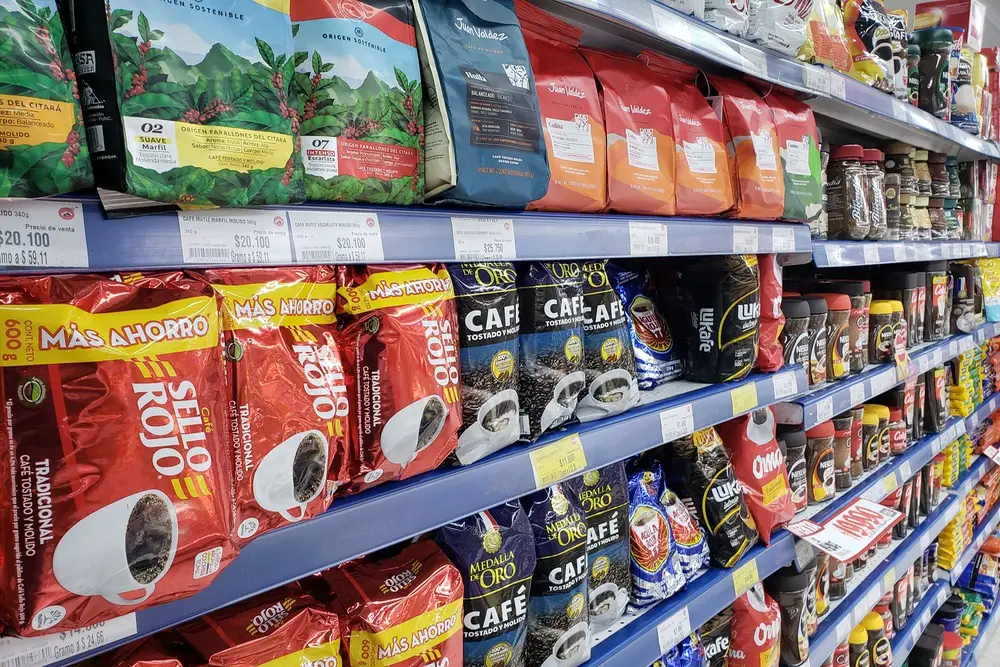You’ve probably heard that coffee causes gastritis or is bad for your stomach.
You may have experienced indigestion yourself after drinking coffee. But does coffee really cause problems in the digestive system?
Well, according to several scientific studies, there doesn’t seem to be a causal relationship between drinking coffee and developing gastrointestinal symptoms.
Table of Contents
Coffee and the gastrointestinal tract
Several scientific studies have examined the effects of coffee consumption on the gastrointestinal tract.
Several of them have found no clear evidence of a link between coffee consumption and the occurrence of digestive problems.
A study published in 2001 examining the effects of alcohol, coffee and smoking on the gastrointestinal tract in 500 adults came to the following conclusion:
- Although 37% of participants attributed coffee to the cause of their gastrointestinal distress, coffee has not been shown to cause dyspepsia (gastrointestinal distress).
However, there was evidence that both smoking and smoking cessation cause dyspepsia.
Coffee and gastroesophageal reflux
On the other hand, gastroesophageal reflux, in which stomach acid flows back up the esophagus, causing irritation and abdominal pain, has long been associated with coffee consumption.
But again, multiple scientific studies have failed to provide any evidence that coffee is the cause of this condition.
For example, a 2004 Norwegian study involving 3,153 patients and 40,210 controls analyzed the association between reflux and various aspects of the participants’ lifestyle.
The researchers found that habits such as high sodium (table salt) intake in the diet had a greater impact on the development of gastroesophageal reflux than coffee consumption.
A 2006 meta-analysis of 16 studies on gastroesophageal reflux found that changing dietary habits, including coffee consumption, did not affect gastroesophageal reflux symptoms.
In other words, those who stopped drinking coffee did not appear to experience any improvement in their symptoms.
Another meta-analysis from 2013 came to a similar conclusion, in which no direct connection between coffee consumption and reflux could be found.
Coffee and the development of gastric ulcers
As defined by the Mayo Clinic in the United States, a peptic ulcer is an open sore that develops on the inner lining of the stomach and upper small intestine. These ulcers are manifested by stomach pains.
The scientific evidence for coffee’s role in the development of gastric ulcers seems unclear, as it has long been believed that coffee may promote the development of gastric ulcers.
However, there is now evidence that this is not the case. A 2003 study in Denmark looked at the risk factors for developing gastric ulcers in 2,416 adults are risk factors for developing ulcers.
However, coffee consumption has not been associated with the development of these lesions.
Another 2013 study involving 8,013 healthy people in Japan also found no link between coffee consumption and stomach ulcers.
Coffee and gastritis
The development of gastritis, a group of diseases that cause inflammation of the stomach lining, has also not been associated with coffee consumption.
The latter two articles document that there is no evidence that coffee affects the development of gastritis.
However, the researchers note that patients suffering from painful gastritis often avoid certain foods or drinks when they are experiencing discomfort, and that self-control is common.
This means that sufferers often assume that the abdominal pain is caused by coffee, but there is no evidence to support this fact.
Coffee and stomach cancer
So far, there is no evidence of a link between coffee consumption and the risk of developing stomach cancer.
In fact, in 2016, the International Agency for Research on Cancer conducted a review of all the scientific evidence available at the time.
Also, no clear link has been found between coffee consumption and the development of cancer anywhere in the body, including the stomach.
Also, a 2015 systematic review and meta-analysis of 23 studies found no association between coffee consumption and the development of gastric cancer.
Also, the results of a 2011 meta-analysis suggest that total coffee consumption, whether caffeinated or not, is not associated with the overall risk of gastric cancer.
However, the researchers found that while there is no evidence that excessive consumption of conventional (caffeinated) coffee, or e.g. B. decaffeinated coffee, causes cancer, but that it could increase the risk of cancer.
The acidity of coffee
Coffee contains several types of acids, but so far there is no conclusive evidence that they alone cause stomach upset.
Also remember that the potency of acids is measured on the pH scale. The lower the pH value, the more acidic a substance is.
For example, when we are fasting, our stomach acid can have a pH between 1 and 1.5. However, when we eat, the pH of the acid can rise to as high as 5.
According to the study, different types of coffee have different levels of acidity. For example, the acidity of coffee ranges from 4.85 to 5.13 on the pH scale.
Also, in this study, the researchers point out that hot-brew coffee has higher acidity than cold-brew coffee.
On the other hand, it has been found that certain types of coffee have lower acid levels than others and it is suggested that the difference could be due to two things:
- To the place where the coffee is grown
- The drying processes to which the beans have been subjected.
Stomach acid
Apparently, the acid in the coffee is not responsible for the stomach upset, but the acid in the stomach itself.
A 2016 study found that while coffee consumption increases the amount of stomach acid, there is no evidence that coffee consumption causes indigestion or bowel problems in participants.
Coffee and caffeine for previous complaints
As we have already seen, there currently does not seem to be sufficient evidence that coffee causes stomach problems such as gastritis or gastroesophageal reflux.
Sure, it’s not a good idea to consume coffee if you already have symptoms of reflux or gastritis; let’s see why.
Caffeine is the substance that “hits” your body every time you drink coffee. So, it is this alkaloid that makes you feel more energetic and focused.
However, caffeine can also cause various ailments in the body, especially if you overdo it or are particularly sensitive to it.
Caffeine in your body
Coffee can have a major impact on the stomach, as caffeine has been shown to cause frequent contractions in the digestive tract.
Caffeine also leads to an increase in the acidity in the stomach because it stimulates acid production in the stomach.
This is especially problematic if you already have gastroesophageal reflux or gastritis, as caffeine can make symptoms worse.
Disturbed mucus production in the stomach
On the other hand, caffeinated beverages tend to have an acidic pH. For example, people who drink alcohol frequently, use tobacco, and/or take many anti-inflammatory drugs are particularly exposed to the effects of stomach acid.
That’s because their stomach doesn’t produce mucus to protect it from the effects of its own acidity.
Therefore, consuming caffeine can aggravate the effects of the acid by increasing the amount of acid in a stomach that is unable to protect itself from its effects.
What to do if the stomach suffers from the coffee?
Remember that if you have an attack of gastritis or reflux, it is best not to drink.
On the other hand, if you find that coffee isn’t kind to your stomach, there are things you can do to avoid the discomfort.
Don’t drink coffee on an empty stomach
When the stomach is empty, the pH of the acid is also at its lowest, i.e. it is at its strongest.
So, when you drink coffee, you add caffeine, a substance that increases the levels of stomach acid, which can lead to heartburn.
So, before you drink that first cup of coffee of the day, eat something because it increases the pH of the acid, making it less likely to cause heartburn.
Choose a coffee with a high roast
Research has shown that coffee beans that are roasted heavily, meaning longer and at a higher temperature, have lower acid levels.
So, if you are looking for a less acidic coffee, you should choose beans with a higher roast.
Prefer cold brew coffee
Other research shows that cold brew coffee appears to have a lower concentration of acids than hot brew coffee.
So, it may be good for you if you have a sensitive stomach.
Variety of coffee is also important
Arabica coffee has the highest acidity, at least among the commercially available varieties. So, try other varieties like Robusta or Liberica coffee.
Avoid additives
Some people prefer to add cream or milk to their favorite coffee. However, if you for example, if you are lactose intolerant, coffee with these additives may not be good for your gut.
So, it might be good to consider another “milk source” like soy or almond milk, which will help you digest the coffee better.
Is decaffeinated coffee an option?
In general, decaffeinated coffee can help because it has a much lower concentration of caffeine than regular coffee, causing less of a rise in stomach acid levels.
Summarized
While there is no conclusive evidence that coffee is the cause of various stomach ailments, as many have claimed, the fact is that caffeine can aggravate various diseases such as gastritis or gastroesophageal reflux.
Therefore, as always, we recommend that you only follow your GP’s advice when it comes to consuming coffee or any substance, no matter how harmless it may seem.
Your doctor knows your current state of health and your risk factors for the development of diseases.



